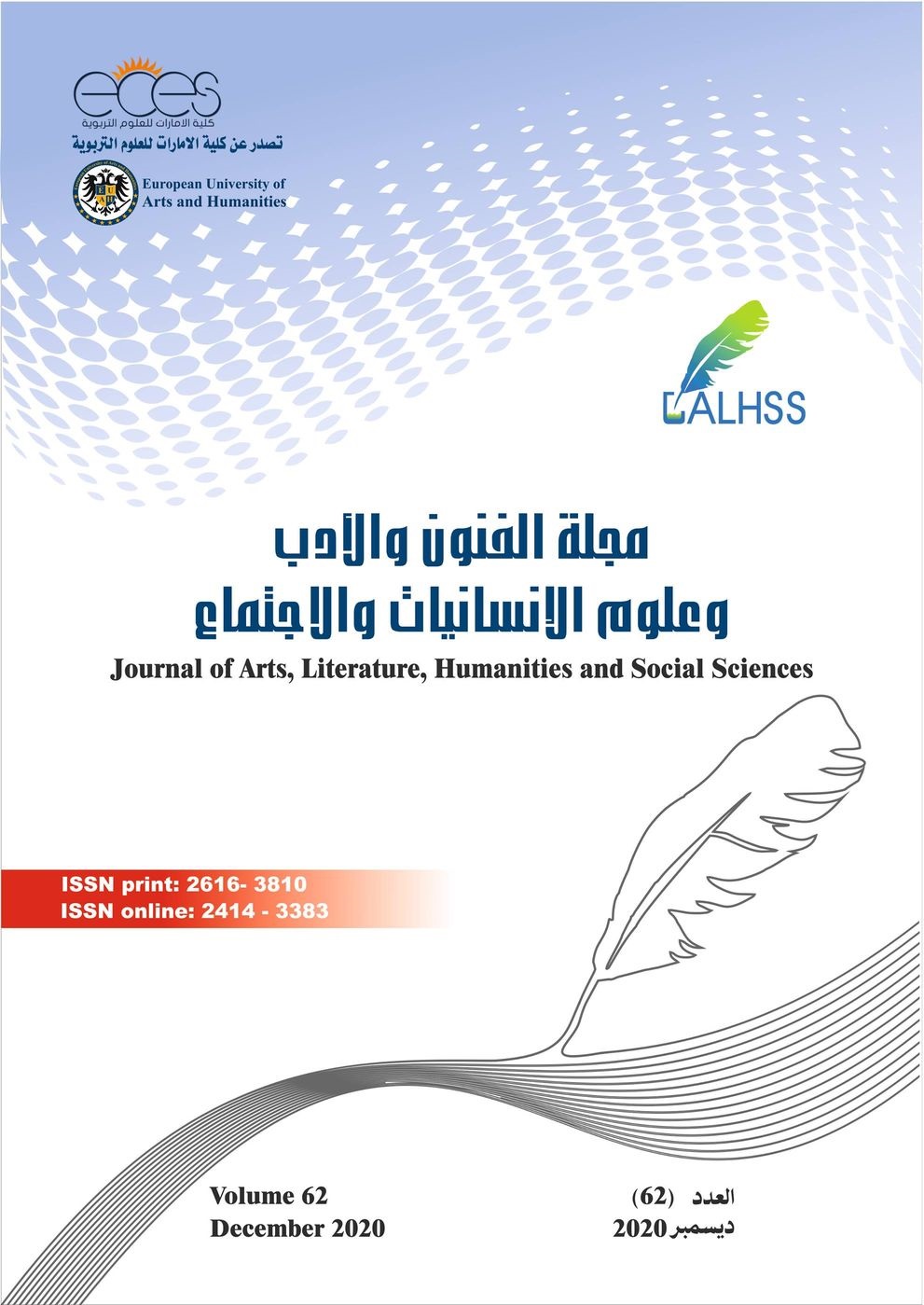Self-confidence Among Musically Gifted Students in the Light of Some Variables
Abstract
This study aimed to recognize the level of Self-confidence among Musically smart students in the light of some variables, the sample of this study consisted of (97) Musically smart students male and female students of education directorate of for Bani Obaid in Irbid governorate, Enrolled in group and individual music competitions of The analytical descriptive method, and the Self-confidence scale were used, and the results indicated the following:
-The Self-confidence level among Musically smart students was high.
-There are no statistically significant differences (α=0.05) due to the impact of gender in all areas and the total degree .
-There are no statistically significant differences (α=0.05) due to the impact of Academic achievement in all areas and the total degree.
References
2. الخلايلة، بغداد.(2017). اثر استخدام الانشطة الموسيقية في تنمية السلوك الاجتماعي الايجابي لدى طلبة الصف السادس الاساسي في الاردن. رسالة ماجستير غير منشورة، كلية الدراسات العليا ، الجامعة الهاشمية، الاردن، الزرقاء.
3. السنباني، ايمان والطارق، علي (2020). الثقة بالنفس وعلاقتها بجنس المعلم لدى طلبة المرحلة الإعدادية في أمانة العاصمة صنعاء. مجلة الآداب للدراسات النفسية والتربوية،3، 8-46 .
4. سهلاوي، مصطفى (2017 ). دور التربية الموسيقية في معالجة السلوك العدواني في الوسط المدرسي - مرحلة التعليم المتوسط . مجلة المربي، 20، .80-99
5. السليمان، هاني (2005 ). الثقة بالنفس . عمان، دار الاسراء للنشر والتوزيع.
6. السيد، ولاء .(2016) الثقة بالنفس لدى الطلبة الموهوبين وعلاقته ببعض المتغيرات الديمغرافية. مجلة الدراسات العليا، جامعة النيلين، 6((23، 177-202
7. العميدي، حيدر و حمزة، عبد الزهرة (2018). الوظيفة التربوية للموسيقى في عروض الاوبريت المدرسي: اوبريت (اقرأ) نموذجا. مجلة كلية التربية الأساسية للعلوم التربوية والإنسانية. 39، 1108 -1120 .
8. قاسم، أمنه و عبد الاله، سحر (2018). السعادة النفسيـة في علاقتها بالمرونة المعرفية والثقة بالنفس لدى عينة من طلاب الدراسات العليا جامعة سوهـــاج. المجلة التربوية، جامعة سوهاج، 53، 81-145.
9. المومني، مأمون والحموري، خالد و يونس، نجاتي والقرعان، جهاد (2011) . بين مستوى القدرات الموسيقية و التحصيل الأكاديمي لدى الطلبة للمتفوقين أكاديميا. المجلة الأردنية للفنون، (1)4، 29-34.
10. Aycan, K. (2017). Decipher singing practices adapted from Kodaly method. Abant Izzet Baysal University Faculty of Education Journal, 17 (4), 1683–1701..
11. Bahar, Aydın. (2019). An examination of high school students’ social skill levels according to participation in musical activities. Cypriot Journal of Educational Sciences , 14 ( 4), 618-629.
12. Bandura, A. (1997). Self-efficacy: The exercise of control. New York: Freeman.
13. Blackburn, Heather.(2017). Music in the Classroom . International Journal of the Whole Child, 2 (1), 26-33 .
14. Edgar, S, N.(2019). Music and the Social and Emotional Challenges of Undergraduate Instrumental Music Students. Update: Applications of Research in Music Education, 37 (3), 46-56 .
15. Feltz, D. L. (1998). Self-confidence and sports performance. In K. B. Pandolf (Ed.), Exercise and Sport Sciences Reviews (pp. 423-457). New York: MacMillan.
16. Girgin, , D. (2020). Motivation, Self-Efficacy and Attitude as Predictors of Burnout in Musical Instrument Education in Fine Arts High Schools. Eurasian Journal of Educational Research,85,93-108.
17. Ilhan, A; Bardakci, U. S .(2019). Analysis on the Self-Confidence of University Students According to Physical Activity Participation. African Educational Research Journal, 8 (1), 111-114.
18. Joseph, D., & Southcott, J. E. (2015). Singing and companionship in the Hawthorn University of the Third Age Choir, Australia. International Journal of Lifelong Education, 34(3), 334–347.
19. Lawrence, D. (2006). Enhancing self-esteem in the classroom (3rd Ed.). London: Paul Chapman Pub.
20. Laukka, Petri. (2007). Uses of music and psychological well-being among the elderly. Journal of happiness studies, 8(2), 215.
21. Malkoc, A ; Mutlu, A, K .(2019). Mediating the Effect of Cognitive Flexibility in the Relationship between Psychological Well-Being and Self-Confidence: A Study on Turkish University Students. International Journal of Higher Education, 8 (6), 278-87.
22. Mawang, L. L.; Kigen, E. M.; Mutweleli, S. M. (2019). The relationship between musical self-concept and musical creativity among secondary school music students. . International Journal OF MUSIC Education; FEB, 37( 1), 78-p90,
23. Onturk, U., and Asma, M. B. (2020). The effect of 12-week service training on self-confidence in racket sport. African Educational Research Journal, 8(2): 410-416
24. Toktas, S ; Bas, M .(2019). Investigation of the Relationship between the Self-Confidence and Motivation of High School Students Participating School Sport Contests. Universal Journal of Educational Research, 7 (2), p472-479 2019
25. Wilkinson, I. (2013). Let there be music: Making a case for using music in schools to enhance relationships and readiness for learning. Canadian Music Educator, 55(1), 28-31.
26. Yondem, S ; Yondem, Z. D; Per, M. (2017).Personality Traits and Psychological Symptoms of Music and Art Students. Journal of Education and Training Studies, 5 (7), 53-59



